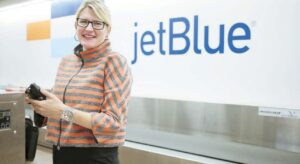
by Heather Cassell
More than a thousand lesbians braved tropical storm Ida and sailed through rough waters to have fun in the sun and to lend a helping hand in the Caribbean last month on Sweet’s maiden adventure on the high seas.
“This is a dream that has come true,” gushed Jen Rainin, 42, an out lesbian and co-founder of Sweet. “It’s going to keep coming true for a very long time.”
“I’ve never been so naturally high,” added out lesbian Shannon Wentworth, Sweet CEO and co-founder.
Sweet evolved out of a desire to combine the two lesbians’ love of travel, building community, and working on social and environmental issues that they care about, the women said. More than two years later Wentworth’s vision set sail out of New Orleans on November 6 and made stops in Costa Maya, Mexico; Belize City, Belize; Roatan, Honduras; and Cozumel, Mexico before returning to New Orleans eight days later.
What sets Sweet apart is that passengers can opt to participate in volunteer activities at the various ports of call, and spend part of the trip giving back to local communities. On this maiden voyage, 310 passengers took part in volunteer projects, out of 1,200 who were on the cruise.
The voyage was also noteworthy as actress Meredith Baxter was a passenger and last week she came out as lesbian in several publications and an appearance on the Today show. Her presence on the cruise was not publicized at the time, Sweet officials said, out of respect for passengers’ privacy.

The Future Of Travel
It wasn’t an easy voyage. Wentworth, 37, navigated Sweet through rough waters both at sea and onshore, earning the praise of queer travel pioneers. The company hopes to emerge as another big player in lesbian travel.
“This is not the future of lesbian travel, this is the future of all travel led by lesbians,” said Charlie Rounds, president of RSVP Vacations.
He applauded Sweet’s creators for making passengers ambassadors of the LGBT community and America and in the process, revolutionizing the future of the travel industry.
“No one is going to say I was a genius on choosing when to start this company,” Wentworth told shewired.com in June about beginning a start-up, luxury, lesbian, eco-friendly, “voluntourism” company during a struggling economy, especially with a reigning queen of lesbian cruises, Olivia, already an established brand.
Judy Dlugacz, founder and co-owner of Olivia, recognized the challenge Sweet faced with the downturn of the economy.
“They came in a very tough time of the economy, that’s tough for them,” Dlugacz said earlier this year.
For their part, Sweet’s founders said they are not in competition.
“I’m really glad that the comparison can die down now that people see the different product. We are not trying to do Olivia’s business,” said Wentworth. “There is no bad blood with Sweet and Olivia.”
“My greatest hope is that other businesses take this idea. What’s good for the environment is good for people and what’s good for people is good for the environment. All of that is good for the world and good for business,” Wentworth added.
The recession got Rainin and Wentworth’s creative juices flowing. Wentworth developed programs to attract younger travelers, made the ship accessible and welcoming to a variety of guests, including those with disabilities and those in recovery. The women also tried to help ease travelers’ stress over tightened wallets.
But mostly, they proved that businesses can be wise and sensitive to their customers’ and their own bottom lines as well as the environment.
“I believe this is the largest carbon-free cruise ever,” said Wentworth, quoting estimates from Carbonfund.org that calculated the cost at $20 per guest on the cruise and airlines and $1.50 per guest at the hotels to offset carbons released into the atmosphere. Carbonfund.org, a carbon reduction and offset organization supports high-quality verified renewable energy, energy efficiency and reforestation projects, according to the organization’s Web site.
Sweet Ambassadors
Sweet also tapped into a new market of travelers. Not attracted to “packaged travel,” Wentworth reached a comfortable compromise attracting politically conscious consumers looking to have fun and do good.
“What we wanted were people who wanted to make a difference in the world and to have fun at the same time,” said Wentworth.
Women representing 10 countries from around the globe conquered sea sickness from Ida, reptiles and bugs of all sorts, swamps and trash laden beaches, homophobia and sexism, and swarms of excited screaming children whose lives were brightened by cartoon painted walls and piles of books, school supplies, and toys brought to them by Sweet passengers.
“I absolutely loved it. Honestly, it took Sweet to get me on a cruise,” said Denise Johnson, 46, a lesbian IT specialist from Chicago. “The beauty of this cruise was the opportunity to give back and that’s exactly what got me on my first cruise.”
Johnson volunteered in three of the four ports putting together computers, painting classrooms, and cleaning beaches, she said.
Darcie Takeuchi, 32, from San Francisco, who volunteered with Johnson on the shores of Mexico and in Belize at an elementary school, agreed. She wasn’t exactly a “cruise girl,” but she was attracted and inspired by an eco-friendly and social justice vacation, she said.
“Just because that is where my heart is,” said Takeuchi, a social worker temporarily turned nanny. “My passion is to be doing outreach and volunteer with communities and families, especially children and families.”
Takeuchi only wished she had been able to volunteer at each port like Johnson, but it was a vacation. Takeuchi took time out to relax with her girlfriend, Lauren Patton, 26, an emergency communications dispatcher for the California Highway Patrol. The two women had fun riding scooters around Cozumel, lying out in the sun by the pool, and meeting like-minded women.
Volunteering didn’t impact Johnson’s free time either.
“I had the rest of my half of the day to have fun, come back [to the ship] and relax or wash paint off,” she said.
Wentworth foresees Sweet’s voluntourists driving future projects, she said.
“What we really want is for our guests to tell us what they want to do, what they can do,” said Wentworth. “[Sweet’s guests] want us to push the envelope more.” Wentworth isn’t just planting seeds hoping that they grow. She plans to keep passengers in the know about the impact they make with the projects.
The ship barley left a port before local governments and communities reported the impact of the projects and invited Sweet back, Wentworth said.
“We have every intention to invest in these communities every few years so we can build on this stuff, we can really see our work grow, and we can see the dialogue grow about gay and lesbian issues in these ports,” said Wentworth, who chose the port cities based on the cruise route that makes it easy to return in the future.

Killing homophobia, sexism with kindness
In the future Wentworth plans on working with LGBT, women’s, and HIV/AIDS organizations as well as staying longer in the ports, she said.
“We can make the biggest impact … in the Caribbean [on] the lives of gay people,” said Wentworth, pointing out that unlike in Mexico and the United States where homosexuality is legal, the biggest impact could be in Belize and Honduras where homosexuality is illegal.
Sweet’s passengers were a curiosity for Belizean press that announced the ship’s pending arrival and crowded around Karl Heusner Memorial Hospital early in the morning only to be turned away by Dr. Francis G. Longsworth, the hospital’s CEO. Kim Simplis Barrow, first lady of Belize, managed the Belizean press by handpicking reporters to cover the lesbian volunteers painting the pediatric ward with American cartoon characters chosen by the kids.
Simplis Barrow is also founder of Lifeline Foundation, an organization that works to improve Belizean children’s lives. The foundation partnered with Sweet and another organization, Magic Brushes.
Sweet managed to avoid attracting press attention at the James Garbutt Seventh Day Adventist Primary School, where parents threatened to pull their kids out of class for the day and shut down the project if it was made public, Wentworth said. That day, most of the school’s 265 elementary students screamed with excitement as they ran from newly painted classrooms to the library and admired tattoo-adorned lesbian and gay volunteers.
“We showed these kids there are different ways to be female,” said Wentworth.
Culture Clash
Some passengers weren’t aware of the anti-gay laws in the countries where the ship docked, however, and ran into some problems.
Chawntea Palmore, 34, a bisexual African American woman from Oakland, felt that Belize was “a little dangerous” and wished that Sweet personnel had been “more forthcoming with all of the information that they have about the port cities.”
Sweet did have information on its Web site about things to do in Roatan and Belize, but not the type of information that Palmore and her friends would have appreciated.
“They were very kind in Honduras,” said Palmore, who enjoyed herself in Roatan and was “glad” she wasn’t aware of the anti-gay laws, yet she insisted, “They took a choice away from me.”
“Belize, it was a very different story,” she said.
Her group ended up returning to the ship after an incident with some men who became upset when one of her friends told them she had a wife. A police officer informed the women of the anti-gay law and that they could be jailed simply for “holding hands” in public, Palmore said.
Other than that experience, Palmore said she had a great time during the rest of the cruise.
Saddened by some guests’ unfavorable response to Belize, Wentworth told the B.A.R. that she doesn’t plan to give up.
“Belize is a community that I really, really want to invest in. They took a really big risk because it’s not a good place to be a homosexual in Belize,” said Wentworth, who was happy for media coverage that caused the city to have a “dialogue about same-sex couples.” She hopes residents’ contact with the volunteers and passengers will change the conversation about queer people and women, she said.
Roatan, Honduras is a different story. Roatan is an island off of Honduras’ mainland, which is the site of human rights violations against queer activists, as reported by the International Gay and Lesbian Human Rights Commission, Human Rights Watch, and other organizations, as well as recent political turmoil. The island, however, remains a different world. A popular port for ships, including gay cruises, residents of the resort island hold a somewhat more global perspective, especially regarding LGBT people.
Roataneans simply “don’t care what you do,” said Shela O. Brooks, a native and owner of Floweras Bay Roatan.
“We would never put our guests in danger,” said Wentworth, aware of the political situations in Belize and Honduras. But she didn’t want to get into politics.
“I want to have fun, save the world,” said Wentworth.
RSVP’s Rounds pointed out the impact Sweet passengers had wasn’t only upon the communities in the port cities, but the estimated 1,000 crew members on the ship who largely came from developing countries.
“For one week by being polite, by being respectful, and being fabulous … that’s an impact that is immeasurable,” said Rounds.
Many crew members said they were happy with the job.
“We all wanted the ‘I am Sweet’ T-shirts,” said Didia Charles, a crewmember from St. Lucia, who said some staff received the shirts and that the guests were so low maintenance that the crew was also allowed some time off.
For more information about Sweet, visit DiscoverSweet.com.
Originally published by the Bay Area Reporter.







